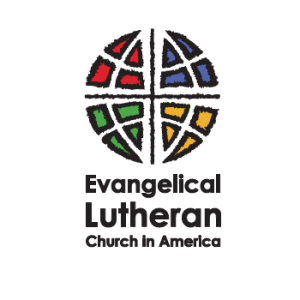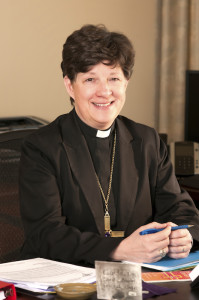September 3, 2015 in ELCA
Bishop Eaton: If God is Enough

We can be free from attachments to our plans, self-will, success
By Elizabeth A. Eaton
From time to time I am invited to celebrate congregational anniversaries. It’s wonderful to see the church in action and to meet members from all across the country.
It is also interesting to see the variety of sizes and architectural styles our buildings come in. Looking at building additions in churches is like studying growth rings in a tree—one can see the periods of rapid growth and contraction. Often the first unit was built one or two centuries ago, the expansion of the sanctuary constructed when the original one was outgrown, and the education wing added in the late 1950s or ’60s. I have seen dozens of churches like this and recall that my last parish had a similar growth pattern.
Very often, however, the membership of these congregations has shrunk. A sanctuary built to seat 400 now only sees 50 on a Sunday. Sunday school rooms and gymnasiums that rang with the sound of children are now empty or, in more enterprising congregations, are rented out to community groups and social service organizations.
In these congregations the anniversary celebration is bittersweet—for one glorious Sunday the sanctuary is filled with current and former members and their children and grandchildren, stories of the congregation’s heyday are shared, there is energy and enthusiasm and then everyone goes home. Next Sunday the 50 hearty souls who are the remnant will gather in a now more obviously empty sanctuary.
There is the sound of lament in many parts of our church. Populations have shifted and people have drifted away. Attitudes about religion have changed and the status of the church in our culture has diminished. This makes us anxious and, in some cases, desperate. How do we stop the decline? Where is the next generation? What happened? What does this all mean?
I have a theory. We are experiencing God’s judgment. Oh, not in a fire-and-brimstone-plague-of-locusts kind of way, but in the tenacious, fearsome, loving claim that God has on all of us. The church does not belong to us. The church is not a vehicle for our convenience, status, success or even comfort. The church is the living body of Christ, breathed by the Spirit and called into deep communion with God. Everything else is at best supplementary and at worst a distraction.
God might be calling God’s people to examine what has a claim on our attention. Where is our energy being drawn?
If the answer to our desperate questions is anything else than to the intimate and complete love of God shown in the crucified and risen Christ, then we are being drawn away from the source of our life as a people and as a church.
There was a provocative article in the December 2012 Christian Century magazine about the “dark night of the church.” In it the authors suggest that what I am calling a time of judgment is actually God at work freeing us from attachments to our plans, our self-will, our success.
The authors asked: “What is the church relearning about itself in its dark night? The church is relearning that its essence lies not in its programs and accomplishments, its activities and accolades, but in the truth that ‘she on earth hath union with God the Three in One’ and that God is enough. Coming to this knowledge means being weaned from the glamorous results-oriented American culture of production, measurement and unlimited growth.”
So, dear church, is God enough? If not, then we are consigned to an endless, exhausting and empty quest for meaning, relevance and purpose. If God is enough, then we have everything we need. If God is enough we are free to love in return and give our lives away for the sake of the gospel and in service to the neighbor. If God is enough we can unclench our hands and our lives. If God is enough we can even let go of the church knowing that it is Christ’s church and not ours.
And, if it is God’s will that there will be an ELCA witness to the gospel, there is no force on earth, not even our own, that can stop it.
Download: September Eaton column (PDF)
A monthly message from the presiding bishop of the Evangelical Lutheran Church in America. This column originally appeared in The Lutheran’s September 2015 issue. Reprinted with permission.


